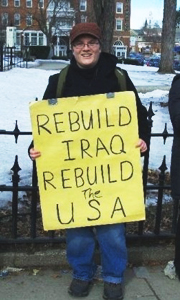Div III: War and Peace in the Pioneer Valley

By Taliesin Nyala 07F
When many people hear words like "strategic essentialism" or "post-colonialism," they cringe—such language has long divided academics from non-academics. But Sarah Hunter 05F doesn't believe it has to be that way.
"Academic language can be classist, but language has this amazing potential to break down barriers and to help people express their thoughts and ideas to others," she says.
 |
"Anthropology gave me a language to think in that [began] influencing other parts of my life," she says. Throughout her writing, she explains all the concepts to allow anyone reading to understand the points she is making and to give people the chance to make so-called esoteric language useful and relevant in their own lives.
"One of my goals was to get more people interested in the Pioneer Valley and to show that it's not a bubble—wherever you are is the real world," says Hunter. "I wanted to see the way this area interacts with the rest of the world."
Hunter says that Western Massachusetts is really dependent on the military, which she wanted to show, but as her research progressed she began focusing more on antiwar activists. Her gateway into that movement was Frances Crowe, a nationally known figure in the antiwar movement since 1959.
Crowe introduced Hunter to different groups and organizations in the area, and Hunter began to find a strong connection between the civilian antiwar movement and veteran and active-duty servicemen antiwar movement. "It's a lot more complicated and multifaceted than some would have you believe," she says.
Hunter covered a range of topics in her Div III, from problems with the phrase "support our troops, bring them home" to the lack of students in the antiwar movement to a chapter on the effectiveness of individual actions in protesting the war. She plans to work on it some more over the summer and to try to get it published.
Before coming to Hampshire, Hunter says that she never would have thought of herself as an artist. But now that she has developed a language of her own, and a writing style with which to engage others, she says she's "started to think of myself as an artist—there's no way I can get people to listen to me unless it appeals to their emotions, it has to have that passion."
Division III faculty committee: Betsy Hartmann, associate professor of development studies, and Michelle Bigenho, associate professor of anthropology.
Article Tags

